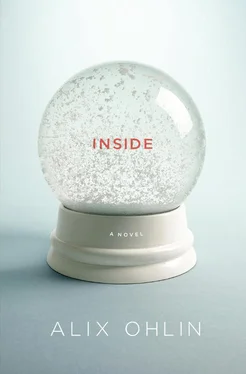Thinking he might’ve come down with something, she drove over to his apartment and rang the bell. The lights were off, and she heard nothing inside. He hadn’t given her a key. But when she turned the handle, the door was unlocked. She walked in and said, “Tug?”
They spent almost all their time at her place, and she’d been here very little since the first weeks they’d known each other. Not much had changed. It was still very neat: no dust, no disarray, not even any mail. Wondering where he put everything, she called his name again.
Getting no response, she climbed the stairs. The apartment was so quiet that she thought he must be out. She walked into his bedroom, and stopped short.
He was lying on the bed, on top of the covers, staring up at the ceiling, his mouth open. His lips were rimmed with white flecks. Then she was on top of him, shaking him, her hands gripping his shirtsleeves, her own heart flopping and seizing, and she said, “What did you take, Tug? What did you take?”
He seemed to be looking at her through the wrong end of a telescope, and it took him a full minute to resolve her into something he recognized. “I didn’t take anything,” he said. “What are you doing here?”
Kneeling next to him on the bed, she wanted to wipe away the flecks from his mouth — spittle, she realized, from the hours he’d been lying there — but she could sense, as if there were an actual barricade, how little he wanted to be touched.
“We were supposed to go out,” she said softly. “Did you forget?”
“Oh.” He looked up back up at the ceiling, then at her. “I’m sorry,” he said, the words sounding hollow, void of content or color.
“Hey,” she said. “Talk to me. Are you okay?”
He swallowed. “A little sick, I guess.”
“Let me get you something,” she said, touching his hand as lightly as she could, knowing he wasn’t physically sick. “Water?”
He nodded. She left the room to fetch it, shaken by the look in his eyes. It wasn’t sadness or numbness, regret or remorse. He knew she wanted to take care of him, and he was looking at her with pity.
When she came back with the glass, though, he was sitting propped up on pillows like an actual invalid. As he drank she opened the curtains, letting the watery March day filter into the room with a lusterless, cloudy, blue-gray light.
He had licked his lips and his mouth was clear. “I’m sorry,” he said again.
“You don’t have to apologize to me,” she said.
“I felt bad last night, and I couldn’t sleep. And then the hours just kind of blended together. I lost track of things.”
“I figured it was something like that.”
There were things she could have said, but she didn’t because she knew he had heard them before. She herself had said them. So instead she sat with him silently, and after a while the clouds seemed to clear and the light grew a little less pale.
Afterward, they didn’t talk about it much.
Tug had gotten up and taken a shower, and they went off to Little Italy. At first he acted vague, distant, like a child who’d just woken from a nap and was still half submerged in the dream world. But soon he was helping her pick out the coffeemaker, and bought her a set of espresso cups, and by the time they were having lunch he was back to his normal self — asking questions, making her laugh. They went back to her place and went to bed, and it was like the conversation they should have had: tentative, then opening, finally finding their rhythm together. For the rest of the day it was as if nothing strange had ever happened.
But the incident had rattled her. She caught herself staring at him, wondering what had set it off. A child he’d seen in the street? A call from his ex-wife? She wanted to ask, but also not to, because she hoped that not asking would bring him to her of his own volition. Whenever he saw her looking at him quizzically, he would shake his head — knowing exactly what she was thinking, and asking her to let it go.
But she couldn’t. Two days later, they were making dinner when she poured him a glass of wine and said, “Can we talk about it?”
“Of course we can,” he said, in a tone that implied just the opposite. He was looking down at a clove of garlic, slicing it carefully. “What do you want to know?”
“Anything,” she said. “Does it happen often?”
“Does what happen often?”
“You know what I mean.”
He sighed heavily and wiped his forehead with the knife still clutched in his hand, seeming more irritated than anything else. “No,” he said, “not often.” Then he grabbed a tomato and started chopping it, round pieces collapsing into their own juice on the plastic board.
“So was it something I said?”
She had meant this as a joke but he flared with annoyance. “Yes, Grace, it was something you said. It was how you ask questions in that special therapist voice that’s supposed to make people tell you everything.”
Take a minute, she told herself. Breathe. She slowly poured herself a glass of wine, watching the liquid rise up in the crystal, a small dark sea. “Why does it upset you so much for me to ask questions?” she said.
“Oh, for fuck’s sake. If you don’t know, then I can’t tell you.”
“Yes, you can,” she said softly. “You just don’t want to.”
“You’re right,” Tug said. “I don’t want to talk to you at all.” He put down the knife and walked out of the kitchen and out of the apartment.
Grace stood there with the half-chopped food, the still-full glasses. Nothing like this had ever happened to her before. Even in their darkest hours — especially then — she and Mitch had never stalked out of a conversation before it was finished. However estranged they had been, or angry, or terribly sad, they had remained almost maddeningly communicative. And since then she hadn’t really gotten to know anybody well enough to feel stricken by an argument, or by a departure, the way she did now.
She felt bereft. She put the food away in plastic containers, drank the wine, and went to bed without eating. She lay there on her back, adopting Tug’s favorite position, as if by imitating him physically she could enter his mental space too. But of course he was still far away, and she only felt more alone.
At midnight the buzzer rang. When she opened the door, his coat was wet from freezing rain, his curls dark and damp, his eyes exhausted.
“I’m sorry,” he said.
She would have carried him inside if she could have. Instead she opened the door wider and stepped back. He walked toward the bedroom, shedding his coat and sweater, rubbing his wet curly hair, explaining that he was testy and tired, that he’d be able to talk about it later but just couldn’t right now, and he led her by this trail of words to the bed and they crawled in together. She could feel his pulse racing like a frantic animal’s. He kissed her hair.
He looked tired in the morning, his creases and wrinkles pronounced, his cheeks ruddy. Even his hands were rough and scaly. He had been weathered by the world. She wanted to pour all the energy she had into him, to siphon it into his bloodstream and organs, to blow the air from her lungs into his.
They lay in bed holding each other, Tug’s chest to her back, and she was crying. She didn’t want to be, but she was, her face resting on his elbow, the hair on his arm scratchy against her skin.
“I’m sorry,” he said. “Please don’t cry.”
She nodded, though she could hardly move her head, he was holding her so tightly. “You need a doctor,” she said. “The right medication … ”
“You’re going to be late for work,” he said softly, kissing her cheek. “Don’t worry. I’ll be fine. Just being with you helps a lot.”
Читать дальше












